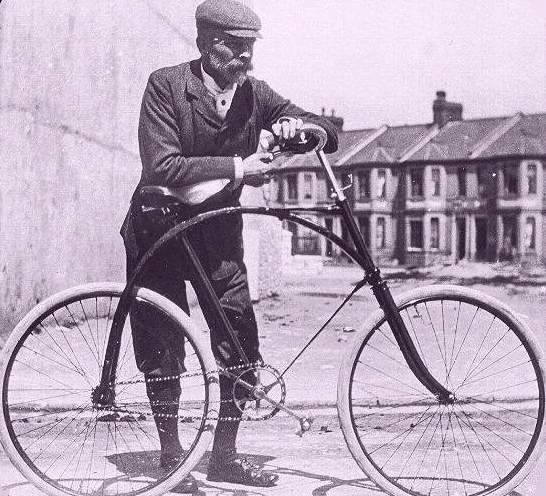Oct 31, 2018 Rachel Kester

Frank Lenz was born with adventure in his blood, and at the tender age of 17, he found a hobby that would forever change the course of his life: cycling.
After receiving his first bicycle as a gift, Lenz rode it faithfully and eventually joined and took trips with his local cycling club, the Allegheny Cyclers, through the nearby trails and roads in his native Pennsylvania.
As his passion for cycling grew he started to take many long-distance rides through the United States. In 1890, he rode from his hometown of Pittsburgh to St. Louis, and in 1891 he rode from Pittsburgh to New Orleans.

The last photograph of Frank Lenz, taken shortly before his disappearance.
In 1892, Lenz decided his job as an accountant was too mundane so he quit it to pursue his passion for cycling. Not long after, he embarked on his cycling world tour with the intention of circling the globe by bicycle after being inspired by Thomas Stevens, the first person to do so.
Not only would this trip provide him with his desired adventure, but Lenz believed it would help to promote the new “safety bicycle” (an invention similar to modern-day bikes with pneumatic tires) during an era where a fascination for cycling was rapidly growing.

Thomas Stevens (1854-1935) on his penny-farthing bicycle.
To help support his expensive trip, he reached out to Outing Magazine. They made a deal with him that if he provided pictures and stories from his ride they would sponsor his excursion.
On May 15, 1892 in Pittsburg, Lenz set out on his mission with his trusty bicycle and camera. He first rode to Washington, D.C. and then across the country until he reached San Francisco.
From there, he caught a boat to Japan where he then rode peacefully through the country before sailing to China. It was while in China that Lenz started to face some problems.

A safety bicycle (the ‘new’ alternative to the high wheeler penny-farthing) in Victorian Plymouth, England, with a predecessor of the Starley diamond-frame.
The roads in China proved to be difficult as many of them were badly maintained and sometimes nonexistent where Lenz planned to ride. The weather was also bitterly cold as it was winter and it was hard to cycle in the snow and ice.
Six months later, Lenz finally made it through the country where he then started to ride through Burma, or what is now known as Myanmar.
Lenz needed to travel through thick jungles while here which caused him to catch malaria, something which slowed him down significantly.

Istanbul landscape.
As Lenz’s health improved, he eventually made his way through Asia and the Middle East, where he reached Turkey with hopes of arriving in Istanbul quickly.
Turkey proved to be a dangerous place for Lenz though, as during this time in history the country was going through some tense battles, such as the Hamidian Massacres. Lenz attempted to ride through the country, but his family and the magazine lost contact with him during the spring of 1894.
After numerous attempts to try to find him, the worst was assumed. While it’s not officially known what happened to Lenz, there are numerous theories floating around as to what did. One theory is that he loved Turkey so much that he claimed a different identity and stayed to live a private life there.
Another is that he drowned in a river during a storm. The most agreed upon theory though is that Lenz was murdered. In fact, a search was done by bicyclist and journalist William Sachtleben, who discovered that Lenz might have offended a local Kurdish chief who then ordered him to be killed and his body and bicycle be buried in the river.
Frank Lenz’s passion for cycling is certainly admirable and his brief tours through various countries and different cultures had a huge impact on him. As he once wrote, “There is a fraternal feeling among the human race.”
While his quest was ill-fated, he left a lasting impact on the world of cycling and inspired many with his adventurous spirit.
